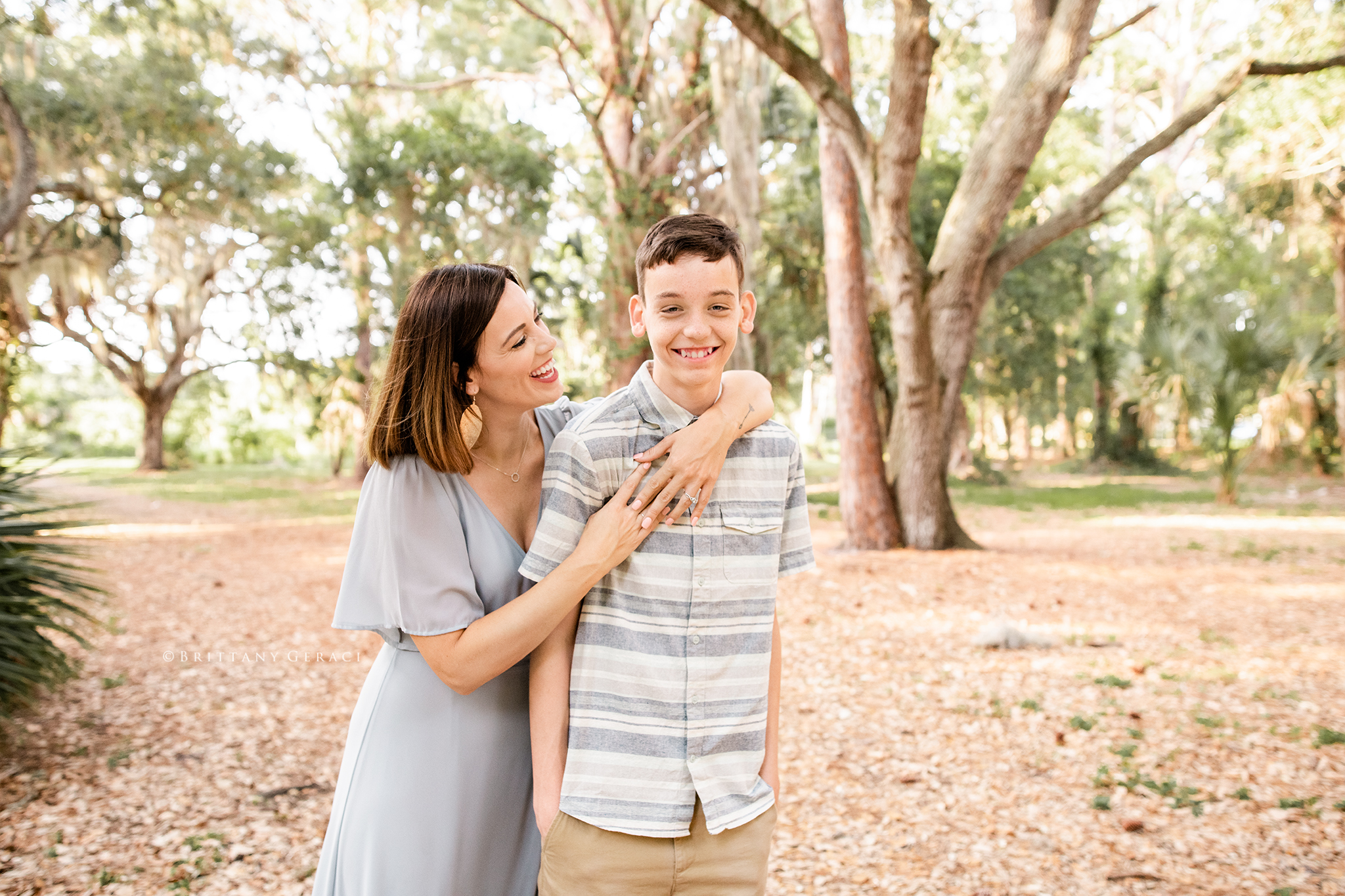Blog
Physical Therapy Exercises for Babies With Down Syndrome
For children with Down syndrome, physical activity and exercise can be inherently more challenging. However, our Fort Myers physical therapy team members recognize the huge role that exercise can play in reducing – and in some cases substantially improving – the many adverse health conditions associated with Down syndrome. Ultimately, exercise can boost a child’s functional ability, which helps them to be more independent.
But why start with babies? Because we already know that children with Down syndrome are going to have certain physical challenges. For instance, many have poor muscle tone (formally known as hypotonia). Some parents will describe this as the quality of being “sort of floppy,” and you’ll notice early on, they have trouble keeping up their neck or controlling their head for any significant stretch – even when other kids their age have mastered this. The earlier we start working on things like core strength, flexibility, and gross motor skills, the more progress they’ll make and the less difficult it’s going to be for them later on.
That said, it’s very important that you only start these exercises with your child after checking with your physical therapy provider and/or pediatrician. Some activities may need to be tailored to meet your child’s specific needs and abilities.
- Categorized: Physical Therapy
- Tagged: Fort Myers physical therapy, pediatric physical therapy, physical therapy kids Fort Myers
Why Our Fort Myers ABA Therapists Use Countdowns for Transitions
Change is an inevitable part of life. But for children on the autism spectrum, transitions can be TOUGH. Our Fort Myers ABA therapists have strategies to help make this easier. One of those is a countdown.
But first, it’s important to understand the why of transition triggers.
What makes transitions so difficult? For a lot of kids, it’s because transitioning from one activity or focus to another can seem sudden. It can also mean leaving an activity that is preferred for one less preferred. Plus, many kids on the spectrum have an inherent need for predictability. Not knowing what is coming next can also set off one’s anxiety, elicit big emotions, and trigger a seemingly outsized response.
As ABA therapists, we are always studying the ABC’s of behavior. That is Antecedent (what comes before the behavior), Behavior (what exactly is the behavior) and Consequence (how is the behavior reinforced). In altering big reactions to transitions, we can alter the antecedent, teach replacement behaviors and reinforce with positive consequences when kids transition calmly.
The idea is to prepare the individual before the transition occurs and support them during the transition.
- Categorized: ABA Therapy
- Tagged: ABA therapists, ABA therapy Fort Myers, Fort Myers ABA therapists, Fort Myers ABA Therapy, pediatric ABA
Fort Myers Occupational Therapists: Learning to Be Flexible is Key for Kids With Autism
Autism is a neurological condition characterized, in part, by restricted, repetitive patterns of behavior, interests, or activities. Someone with autism may insist on adhering to the same routines and rituals – and any attempt at changing the slightest element can set off a major meltdown. But the fact is: We live in an ever-changing world. As Fort Myers occupational therapists, one of our primary goals when treating children with autism spectrum disorder is to teach them flexibility.
Flexibility is the quality of being easily bent but not broken. It’s not a natural skill for any of us. Think about your reactions when events take a sudden, unexpected (and unwanted) turn. But the ability to be flexible is what allows us to move on from the big emotions of that and continue with the task or the rest of the day.
Change is just an inherent part of the world we’re in. Lots of kids with autism struggle with this – and often for seemingly very minor things. Helping them learn to get themselves “unstuck” is critical for functioning in daily life.
Speech Therapists: Say ‘Sayonara’ to the Sippy Cup!
If you ask any parent of young kids whether they’re game for a product that is affordable, reduces spills and messes, and is super convenient, of course you’re going to hear: Yes, Please! Unfortunately, convenience for parents isn’t always what’s best for children. Case-in-point: The sippy cup. Speech therapists who study feeding and swallowing development and speech-language development will tell you: You really should ditch the sippy.
It’s really made more for parents than for kids. Someone got tired of their toddler spilling all Tang on the carpet and the rest is history. Sippy cups are marketed to parents as a necessity. But our Fort Myers speech therapists will beg to differ.
Some things to consider:
- Overuse of the hard sippy cup spout impedes swallowing development. During the baby’s first year, he or she will primarily use a front-to-back tongue movement to pass liquids and soft solids to the back of their mouth so they can swallow them. Speech therapists call this pattern suckle-swallow. But by the time they get to be about 12 months, their swallow pattern will mature. The tip of the tongue will rise to the bumpy, gum line ridge (where you make the /d/ sound) and begin using wave-like motions. This is what allows them to swallow a greater variety of textured foods. If your child is drinking solely from a sippy cup or bottle, this development milestone can be delayed.
- “Paci-mouth.” Yes, this refers to the damage that can be caused by overuse of a pacifier, but something similar can occur with sippy cups. If the tongue isn’t able to go up during swallowing, it will generally come to rest in a forward position in the mouth. This can potentially impede speech-language development. If your child only uses a sippy cup very occasionally, this likely won’t be a problem. But for lots of kids, sippy cups are constant companions. Speech-language skills can be stunted for kids who don’t get past that suckle-swallow pattern by the time they’re 1.
- Facial development delays. There is a muscle in the face called the genioglossus. Heavy use of a sippy cup can impede its development, which can lead to mouth-breathing. Mouth-breathing is associated with slowed facial development.
Why Our Fort Myers Speech Therapy Intake Forms Inquire About Low Birth Weight
Some parents note when filling out our Fort Myers speech therapy intake forms that we inquire as to whether their child had a low birth weight. You may wonder what this has to do with speech therapy. The answer, as noted in research published by the National Institute on Deafness and Other Communication Disorders, is that compared to babies with a birth weight in the normal range, those with low birth rate:
- Were more likely to have a communication disorder.
- Were more likely to have used speech-language, occupational, and physical therapy services.
- Had weaker motor abilities.
- Had lower school performance.
- Had higher incidence rates of pneumonia.
- Were three times more likely to repeat a grade.
In short, while some babies with low birth weight are perfectly fine, some are at high risk for communication and developmental problems that can extend well into childhood. Our Fort Myers speech therapy team at FOCUS Therapy can help.
FOCUS Therapy Opening Second Fort Myers Location Near Gulf Coast
Big news, FOCUS Family: FOCUS Therapy is opening a second location in Fort Myers!
Our new FOCUS Therapy location, conveniently situated near FGCU, Gulf Coast Town Center and Southwest Florida International Airport (RSW), will allow us to expand our vital services (speech, occupational, physical & ABA therapies and ADOS testing) to hundreds more children in one of the fastest-growing communities in the country.
The new FOCUS Gulf Coast Office, located at 9961 Interstate Commerce Dr., Unit 150 & 160, will officially open its doors Aug. 9, 2021. This new facility will allow us the capacity to ultimately onboard an additional 20 therapists and treat 200 more children than our existing patient list. We’ve hired 10 new therapists to start, and will bring on more as we grow throughout the next year.
“Opening this new site is both extremely exciting and deeply humbling,” said FOCUS Owner/Founder Jennifer Voltz-Ronco. “I set out to fill a critical need in this community 10 years ago, at a time when there weren’t enough clinics providing pediatric therapy in Southwest Florida. There still aren’t. As the population in our area continues to grow at a rapid speed, the demand for quality therapy has expanded at an even faster clip. This brings us one step closer to ensuring all children in Southwest Florida have access to the therapy services they need to succeed.”
At our existing location on Royal Gulf Circle off Colonial Boulevard, we have a waitlist of 160 children. Similar waitlists are reported at other pediatric therapy clinics throughout Southwest Florida.
According to the National Institute on Deafness and Other Communication Disorders, roughly 9 percent of kids in the U.S. have a speech sound disorder. Further, about 5 percent of kids have a noticeable speech disorder by 1st grade. Now consider that in 2020, the U.S. Centers for Disease Control and Prevention reported approximately 1 in 54 children in the U.S. is diagnosed with autism spectrum disorder (ASD). That’s 1 in 34 boys and 1 in 144 girls, with diagnoses being reliably made as early as 18 months. There is a mountain of clinical evidence showing these kids can thrive – but only with access to intensive, early intervention therapies (speech therapy, occupational therapy and applied behavior analysis).
Whether we’re talking about a speech delay, down syndrome, autism, cerebral palsy, brain injury or other condition, the more assistance a child receives early on, the better their odds of school readiness, social engagement, academic success and long-term independence. That’s because neuropathways for young children are still developing, and young minds are little sponges for new knowledge. This ability of the brain to change, rewire, relearn and strengthen key connections is called neuroplasticity. It’s especially agile during early childhood, and that’s why we’re so adamant in preaching early intervention. It’s also why we couldn’t delay any longer in opening a second FOCUS Therapy clinic location.
“Children cannot wait for services this important,” Voltz-Ronco said. “This new Gulf Coast location of FOCUS Therapy is going to allow us to reach more kids in this community – and faster – benefiting not just themselves, but their families, the schools and our entire community as a whole.”
FOCUS offers pediatric speech therapy, occupational therapy, ABA therapy, physical therapy and ADOS testing in Fort Myers. Call (239) 313.5049 or Contact Us online.
More Blog Entries:
Therapy Isn’t a Quick-Fix – Why You Should Still Follow Our Course Until Successful, May 7, 2020, FOCUS Therapy Fort Myers Blog
Why FOCUS Therapy Celebrates With “Therapy Graduation” Ceremonies, Sept. 5, 2020, FOCUS Therapy Fort Myers Blog
FOCUS Therapy ABA Talks: Hosted by Our ABA Team!
FOCUS Therapy ABA Talks
At FOCUS Therapy, we offer speech, occupational, physical, and ABA therapy. For that last one, "ABA" stands for "Applied Behavioral Analysis." It also sometimes goes by the name, "behavior therapy." It involves the study of behavior and ways it is reinforced. ABA therapy is considered the gold standard for treatment of children with Autism Spectrum Disorder and other conditions that make it difficult to communicate and behave in ways that are expected.
The concept of what ABA therapy is and how it works is often unfamiliar to families who first seek our services on the basis of a physician referral. In an effort to help parents and families better understand ABA and how it works, Dr. Dean Funk, M.D./B.S. Biological Science and the rest of our FOCUS Therapy ABA team have created a series of in-depth videos we hope will better explain it all.
Insight is provided by invaluable members of our FOCUS Therapy ABA team, including Ignacio Fernandez, BCBA.
Watch the videos below!
- Categorized: ABA Therapy, Behavior Therapy, FOCUS News
- Tagged: ABA therapy Fort Myers, ABA therapy Southwest Florida, FOCUS ABA therapy, FOCUS Florida, Focus Therapy
Love What We Do? Write Us an Online Review – For a Chance to Win Back-to-School Supplies!
- Composition books
- Crayons
- Glue
- Pencil pouches
- Pencils
- Tissue boxes
- Folders
- Scissors
- Germ X
- Other school supplies that are sure to be on your child’s back-to-school list!
- Categorized: FOCUS News
- Tagged: FOCUS Fort Myers, Focus Therapy, occupational therapy for kids, speech therapy for kids
My Son Has Autism… When – and How – Should I Tell Him?
Your child has autism. You know it. The rest of the family knows it. His teachers and therapists know it. Maybe even a few of his classmates know it. But when should HE know it? And how should you tell him?
It’s something many of our FOCUS Therapy families grapple with at some point, and answers really depend on the individual. Some parents opt to tell their child when they’re very young, hoping an early understanding of why they struggle more with certain things might make it all less confusing. Other parents wait until their child becomes aware of their differences and starts asking questions. A few parents wait until their child is older with a better ability to fully grasp what their diagnosis means. Our FOCUS speech, occupational and ABA therapists know there isn’t a singular right answer, but we’re here to support our patients and help guide families in these discussions.
Recently, a patient’s mother asked about the best way to handle some of the questions her 7-year-old son on the spectrum was asking. Christie Lawrence, a registered behavior technician (RBT) with our Fort Myers ABA therapy team and herself the mother of a teenager with autism, offered her thoughts.
“I would say the most important part of informing your child of their autism diagnosis is to empower them,” Lawrence said. “Autism can bring many gifts, and it’s so important to teach our children to find and focus on their strengths and build confidence from their success.”
What to Expect in a Feeding Therapy Evaluation
Many people think of the role of speech therapists as being limited to speech and language. However, we also play a key role in pediatric feeding therapy evaluation and treatment.
Our Fort Myers speech-language pathologists are experts in oral mechanics – all the way down to the esophagus. We’re specially qualified to support individuals with feeding and swallowing difficulties.
Most people don’t put a ton of thought into the process of feeding and swallowing, but but both actually involve dozens of steps and systems working in conjunction. Feeding is what it takes to get food off the plate and into the mouth. Swallowing involves all the steps it takes to chew and then move food down the throat while protecting the airway leading to the lungs.
A child may have a feeding AND swallowing disorder, or just one or the other. For example, a child on the autism spectrum may have a feeding disorder wherein their food intake is extremely limited due to sensory processing difficulties. They may only need feeding therapy. A child with tracheostomy tubes or dysphagia (difficulty swallowing) or odynophagia (pain while swallowing) may only need swallowing therapy.










